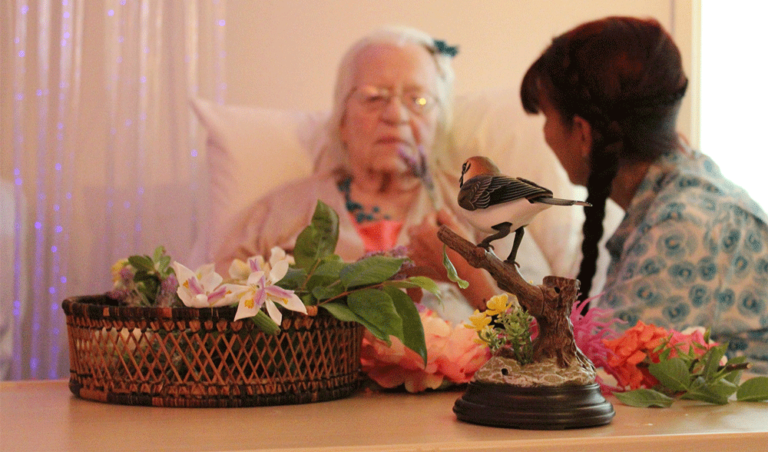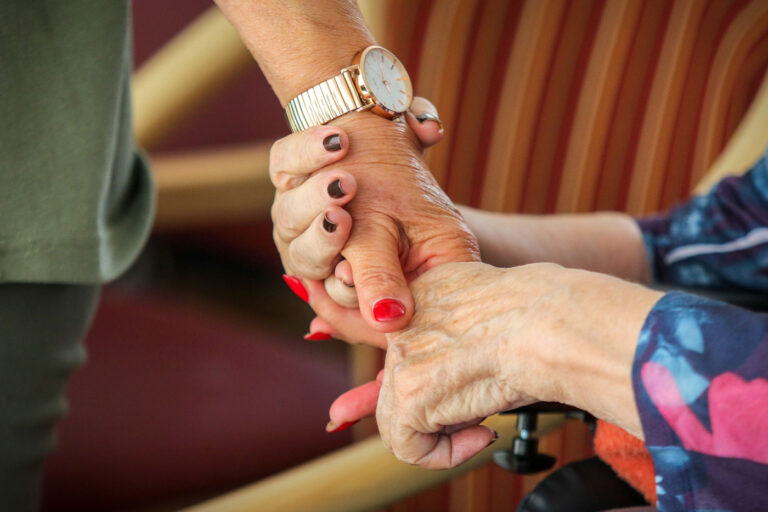What is palliative care in aged care?
Palliative care is not just about end of life, it’s about quality of life.

When people think of palliative care, they usually assume the person in care is now dying. In actual fact, palliative care is not the same as end-of-life care, and is designed to improve the quality of life for a person at any stage of a serious illness.
What is palliative care?
Palliative care is a type of comfort care and support for a person with a life-threatening or life-limiting illness. A health professional may recommend palliative care to a person early to diagnose and treat the cause of symptoms, manage medications, help with communication or decision-making about treatment options, and provide family support.
What services are offered?
Palliative care is a holistic approach to care that considers the person's overall physical, psychological, spiritual and emotional needs as well as the needs of their family. This could include:
- Managing physical symptoms (e.g. pain)
- Assisted living services such as washing, meal preparation and cleaning
- Emotional and psychological support, such as counselling, for the person, families and carers to manage stress and difficult emotions such as grief and anger
- Spiritual care such as religious counsel, or participation in faith-based rituals
- Hire of equipment such as bed and wheelchairs
- Access to assistive therapies such as massage and music therapies
- Access to culturally significant services
- Referrals to respite care services.
A person of any age can receive palliative care, and it is possible for a person to have palliative care and recover from their illness. You can also receive palliative care while you are having other therapies by your medical team to treat a life-limiting illness.
What is the difference between palliative care and end of life care?
While palliative care and end of life care can overlap in some ways, the two serve different purposes. Palliative care is specifically tailored to assist with the effects of a life-limiting illness, while end of life care is offered to a person in the last stages of life.
End of life care aims to make a person with a terminal illness as comfortable as possible in the final stages of life as the body starts to shut down and the person may lose mobility or the ability to consume food, beverages or medications.
Learn about the difference between palliative care and end of life care
What does palliative care in residential aged care look like?
Palliative care services can be provided in a range of settings including your home, a hospital, a hospice or residential aged care.
If you are choosing an aged care centre for a loved one, you may want to consider asking about the palliative care programs offered as part of the services provided at the care centre.
Specialist palliative care programs in residential aged care are designed to enhance the quality of life of a resident living with a serious illness and help them maintain their independence, while also supporting their family. Palliative care is provided in addition to any specialised care required at the care centre.
Specially-trained aged care services staff provide a palliative care program featuring clinical care, including wound and pain management, personal care, comfort care and sensory experiences while ensuring family and friends get to spend quality time with their loved one, with support from staff.
An example of a specialist palliative care program is IRT's Namaste program, which is part of our Journey of Care model. Trained IRT staff integrate sensory stimulation into care delivery using therapeutic touch, aromatherapy, music and sensory experiences.
Founded on the power of loving touch, some of the benefits of our Namaste program include:
- A relaxed and fulfilling environment
- Reduced need for medication
- Decreased pain
- Fewer incidents of aggression
- Increased social interaction
Who provides palliative care services?
A multidisciplinary team of medical, nursing and allied health professionals will provide your palliative care services, whether you are at home, in hospital or at an aged care centre.
The team is trained to help and support a person living with a serious illness to manage their symptoms and needs, and may include nurses, doctors and specialists, social workers, physiotherapists, psychologists and counsellors, and trained volunteers.
What quality of life is there in palliative care?
The effectiveness of palliative care is proven. Multiple clinical trials have demonstrated the benefits of accessing care for people living with a serious illness. Research shows that people with a serious cancer who access palliative care soon after their diagnosis, alongside their recommended cancer treatments, have better outcomes. Patients feel better, have fewer symptoms, are happier and overall have a better quality of life. There is also growing evidence to show people receiving palliative care live longer.
As a result, palliative care services reduce the need for crisis hospitalisations, which are not only difficult for patients and families, but costly too. Palliative care allows people to remain safely in their homes and communities, is better for patients, and reduces pressures of the health care system.
With an ageing population and an increased life expectancy for people over 85, palliative care in aged care is becoming increasingly important in improving the lives of older Australians. Rather than just being available for a person approaching the end of their life, palliative care provides an added layer of long-term support for people with a serious illness at the same time as clinical treatment, providing them with comfort and connection when it's needed most.
Your state or territory department of health can provide additional resources on palliative care services for people living with a life limiting illness and their families and carers.

Palliative care at IRT
At IRT, many of our aged care centres offer specialised palliative care and end-of-life care in a supportive and calm environment where our palliative care team puts the individual first. Participating care centres offer 'Serenity' neighbourhoods: defined areas which offer specialised palliative care to help residents manage symptoms and access the personalised care and support they need to manage a life-limiting illness. We also have a Namaste program at participating care centres that focuses on treatments such as therapeutic touch, aromatherapy, and music therapy.
Find out moreYou may also like
Here's what happens if you neglect your physical health
Staying fit during these times can be hard but we've got plenty of simple tips to help keep you active.
Osso Bucco
Osso Bucco is easier than you think! Impress your family and friends when you cook up a storm with this delicious recipe.

